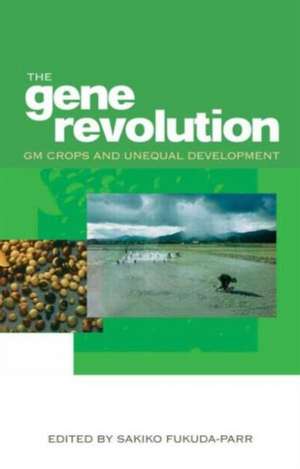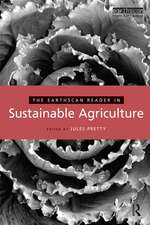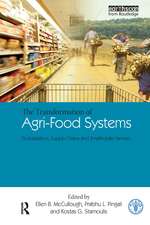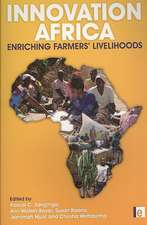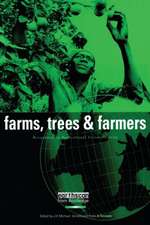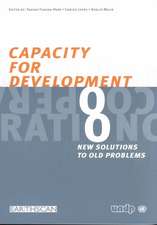The Gene Revolution: GM Crops and Unequal Development
Editat de Sakiko Fukuda-Parren Limba Engleză Paperback – dec 2006
| Toate formatele și edițiile | Preț | Express |
|---|---|---|
| Paperback (1) | 129.78 lei 6-8 săpt. | |
| Taylor & Francis – dec 2006 | 129.78 lei 6-8 săpt. | |
| Hardback (1) | 249.89 lei 6-8 săpt. | |
| Taylor & Francis – dec 2006 | 249.89 lei 6-8 săpt. |
Preț: 129.78 lei
Preț vechi: 170.28 lei
-24% Nou
Puncte Express: 195
Preț estimativ în valută:
24.84€ • 26.99$ • 20.88£
24.84€ • 26.99$ • 20.88£
Carte tipărită la comandă
Livrare economică 21 aprilie-05 mai
Preluare comenzi: 021 569.72.76
Specificații
ISBN-13: 9781844074099
ISBN-10: 1844074099
Pagini: 280
Dimensiuni: 156 x 234 x 25 mm
Greutate: 0.43 kg
Ediția:1
Editura: Taylor & Francis
Colecția Routledge
Locul publicării:Oxford, United Kingdom
ISBN-10: 1844074099
Pagini: 280
Dimensiuni: 156 x 234 x 25 mm
Greutate: 0.43 kg
Ediția:1
Editura: Taylor & Francis
Colecția Routledge
Locul publicării:Oxford, United Kingdom
Cuprins
Introduction: Genetically Modified Crops and National Development Priorities * Emergence and Global Spread of GM Crops: Explaining the Role of Institutional Change * US: Leading Science, Technology and Commercialization * Europe: Turning Against Agricultural Biotechnology in the Late 1990s * West and Central Africa: Strategizing Biotechnology for Food Security and Poverty Reduction * Part II: GM Crops for Development: The Experience of Argentina, Brazil, China, India, South * Argentina: Adopting RR Soy, Economic Liberalization, Global Markets and Socio-economic Consequences * Brazil: Confronting the Challenges of Global Competition and Protecting Biodiversity * China: Emerging Public Sector Model for GM Crop Development * India: Confronting the Challenge - The Potential of Genetically Modified Crops for the Poor * South Africa: Revealing the Potential and Obstacles, the Private Sector Model and Reaching the Traditional Sector * Part III: Comparing and Analysing Developing Country Experiences * Institutional Changes in Argentina, Brazil, China, India and South Africa * The Role of Government Policy: For Growth, Sustainability and Equity
Notă biografică
Sakiko Fukuda-Parr is a Visiting Professor at the Graduate Program in International Affairs, The New School, in New York City. She was Fellow at the Kennedy School of Government, Harvard University, and from 1995-2004 she was Director and chief author of UNDP‘s Human Development Reports including the 2001 Report: Making New Technologies Work for Human Development.
Recenzii
'A much needed antidote to the highly polemical writing on both sides of the this issue'Raymond C. Oppenheiser, President, Oxfam America'...a hugely valuable contribution to the dialogue and debate surrounding the future of genetic technologies for developing countries.'New Agriculturist'An accessible introduction to the food and environmental policy issues posed by the Gene Revolution ... should be required reading!'Vernon W. Ruttan, University of Minnesota'Shows how biotechnology research and development could be fostered on the principle of social inclusion in access to its fruits ... [and] clearly elucidates the pathway to avoiding the addition of the genetic divide to the other divides prevailing globally and nationally'Professor M. S. Swaminathan, Chairman, National Commission on Farmers, Government of India'An indispensable guide for evidence-based discussions on the institutional aspects of biotechnology' Calestous Juma, Harvard University, USA'Should the developing world embrace genetically modified crops? Should NGOs and development advocates get fully on board? Read this book to understand why the answer is, absolutely, yes ... and to explore what the conversation now should be really about: the policy and institutional fixes in patents, licensing, seed marketing, biosafety regulation, and more that will ensure the potential benefits of the agro-tech revolution reach the world's poor'Nancy Birdsall, President, Center for Global Development
